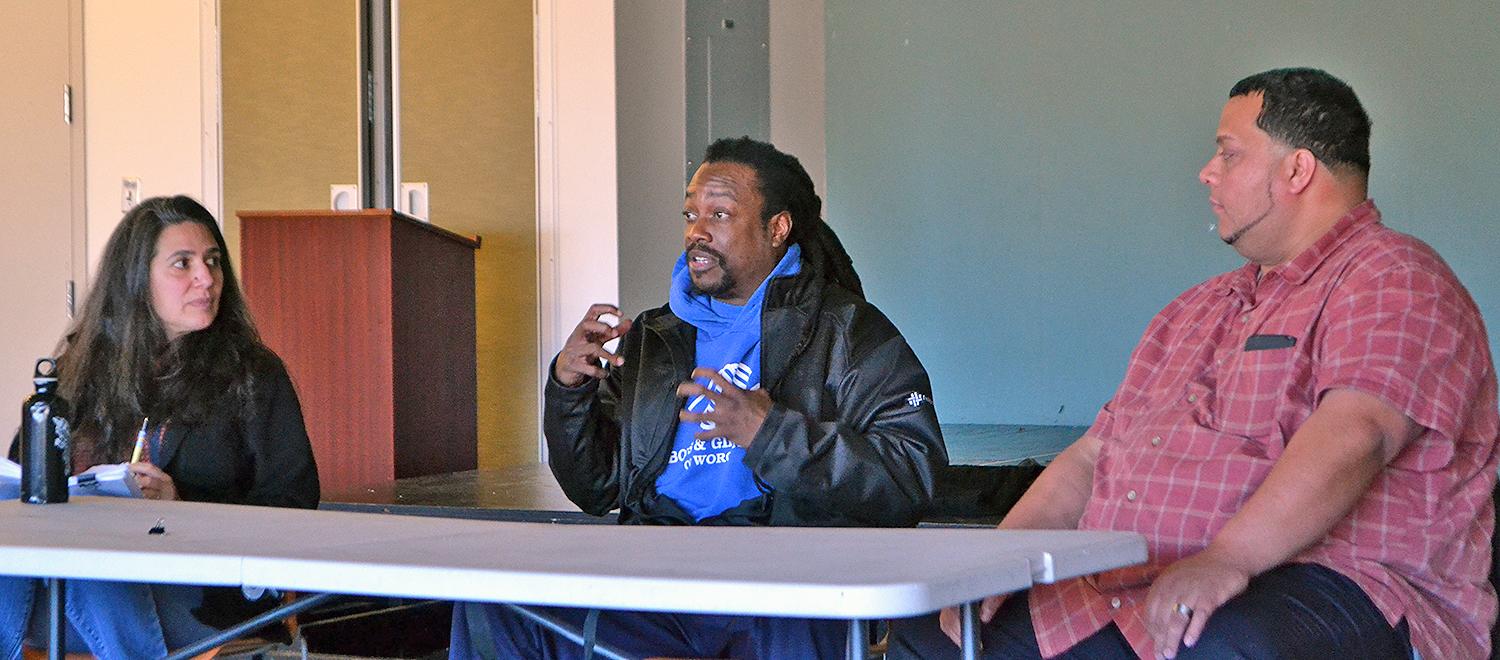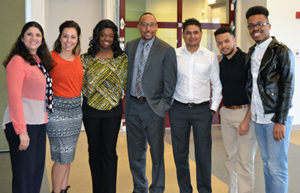
Worcester City Councilor Khrystian King knows teen violence firsthand. By the time he was in his 20s, he had lost three friends to gun violence and served as a pallbearer at two of their funerals. Since then, he has worked to better the lives of youth and families, as a mentor, social worker and the first black man elected to the City Council in 80 years.

“As a youth worker, you’re a leader. You don’t know who’s watching you; you don’t know how long they’ve been watching you,” said King, keynote speaker at the May 2 graduation for the Youth Worker Training Institute, co-sponsored by Clark University and Worcester’s HOPE (Healthy Options for Prevention and Education) Coalition, a youth-adult partnership of 17 local organizations.
“You’re planting seeds. You don’t know when they’ll blossom,” he told the 28 graduates, the largest class in the institute’s 12-year history. “It’s all about consistency and being genuine and being transparent. You have to give respect to form a relationship.”
It’s a message that resonates with Laurie Ross ’91, M.A. ’95, associate professor of community development and planning and director of HOPE and Clark’s Certificate Program in Youth Work Practice. In her more than two decades of research and collaboration with local partners, Ross has emphasized the lifelong experience and knowledge of youth workers and community activists like King. She eschews an “ivory tower” research approach. Instead, she views community members as the experts who can best identify solutions to gang violence, youth homelessness and other significant neighborhood issues.
As the research partner for Clark’s grant from the Senator Charles E. Shannon Jr. Community Safety Initiative, she also has worked for 10 years with the city of Worcester and other local groups to reduce gang violence.
One way to ensure youth don’t get caught up in gang violence is to provide them with safe places to build relationships with caring adults and develop lifelong skills – the Boys & Girls Club, YMCA, YWCA, Girls Inc. and other local organizations – where they can connect with role models. But these youth workers have told Ross they need more support and professional development to do their jobs well.
Clark’s certificate program grew out of that identified need; so did Ross’ recently published book, Dilemmas in Youth Work and Youth Development Practice (Routledge).
“Youth workers put the well-being of young people at the center of their efforts,” Ross said when launching the certificate program two years ago. “Most of the time, youth workers have to learn how to do this on their feet. There are very few opportunities for professional education for this field.”
Like her participatory, community-based research, Ross’ book puts youth workers’ knowledge and experience front and center. Although she and her co-authors — several of them her former graduate students — cite academic research, they don’t privilege it. Instead, they draw mostly from what they call “the rich personal and professional knowledge [youth workers] possess about youth development and culture, and how to read a situation.”
“Youth workers face dilemmas and challenges every day,” Ross said. “Youth workers need to analyze dilemmas in the moment and understand the complexity of a problem. They need to think about what is going on in the community and in the family and what impact that might have on youth behavior and their own interactions with youth.”
Those “dilemmas” – which are discussed through case studies in the book – range from dealing with violence, drug use and gang activity to maintaining respectful and professional boundaries with the children and teens. The book also explores how youth workers can counter “oppressive community conditions such as racism, sexism, ageism, homophobia and classism,” and offers reflections, discussions and suggested activities for youth workers seeking to learn from their expert peers.
In one case study, for example, a youth worker with the pseudonym of “Jessica” develops an action plan after gang violence escalates and two teens from her program are involved in a shooting. The victim and the perpetrator are rival gang members.
“Jessica’s ability to persevere comes from her considerable firsthand knowledge of gang violence in the city. She has the personal knowledge to understand the dynamics of gangs and the pull of street life not because of something she read or studied but because she grew up in it. She has a deeper understanding of what the youth involved in the shootings are going through,” the authors note. “It is clear that Jessica’s personal and practice knowledge plays a key role in how she perceives and addresses this dilemma.”
Ross uses Jessica’s case study and others to teach an international development, community planning and environment (IDCE) course on “Youth Work: Everyday Practice and Social Justice,” which is required for Clark’s Certificate Program in Youth Work Practice. Students in the course are practicing youth workers from Worcester and beyond as well as master’s degree students at Clark. Ross also invites practicing youth workers as guest lecturers for the course.
By integrating these real-life experiences, Ross ensures the students “learn from other youth workers who are leaders in their fields,” she said.
One class session, for instance, focused on “Responses to Risky Behavior and Dangerous Situations.” Ross welcomed two experienced local youth workers – Roberto Diaz MA’12, director of community-based services at CENTRO, and Ike McBride, director of operations for the Boys & Girls Club of Worcester – to talk about how they defused tense situations when youth threatened violence.
Because both men grew up in Worcester, they have developed knowledge of the neighborhoods and streets that helps them build positive relationships with children, teens and families – and act quickly in stressful situations.
“Part of it is sixth sense. You feel when things aren’t going right. That’s when the decision-making starts,” McBride told the students in Ross’ class. “When these kids hit the teenage years, there’s an edge to them. The most important thing is to build relationships.”
Diaz said he identifies with the kids because he remembers what it was like to grow up surrounded by others who were not always making the best choices. He found solace at the Main Street YMCA, where he worked as a peer leader, but he “was always one or two difficult decisions from all hell breaking loose in my life.”
McBride and Diaz spoke at the Boys & Girls Club, where Ross’ class met during the semester. It’s also where the Youth Worker Training Institute held its recent graduation. Students in the institute take “Fundamentals of Youth Work,” taught by adjunct professor Jennifer Safford-Farquharson. Some decide to pursue the certificate program and eventually take Ross’ class as well.
During her class last fall and at the graduation this May, Ross watched from the sidelines as others – Diaz, McBride, King and the professional youth workers participating in courses at Clark – took the floor. At the graduation, she spoke only for a few minutes: to congratulate and thank the youth workers who helped lead trainings for the institute. In class, she never lectured; instead, she asked leading questions that prompted Diaz, McBride and her students to demonstrate their expertise.
It was typical for Ross, who often steps aside, empowering others to lead and speak out.
“The answers don’t come from me,” she said. “They come from the youth workers who are deeply involved in these issues every day.”
Pictured in photo at top: Laurie Ross, Ike McBride (center) and Roberto Diaz
More on Laurie Ross’ book
Laurie Ross is lead author of Dilemmas in Youth Work and Youth Development Practice (Routledge), with three of her former students as co-authors – Shane Capra, MA’13; Lindsay Carpenter, MA’11; and Julia Hubbell, MA’12 – as well as Kathrin Walker, associate professor and specialist in youth work practice at the University of Minnesota Extension Center for Youth Development.


